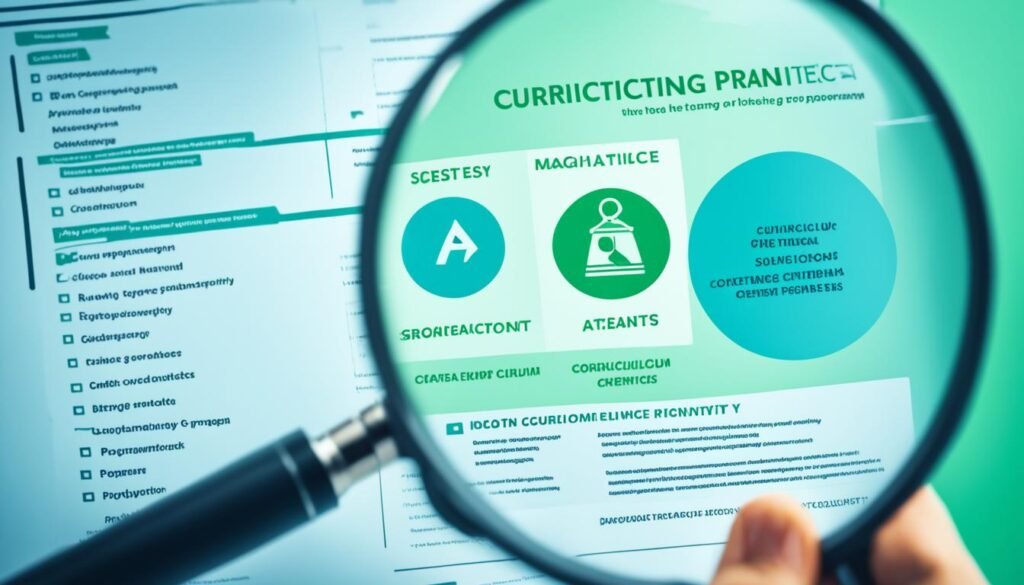Did you know there are over 866 courses in English on AI ethics? The world is moving fast with artificial intelligence, making ethical AI education more important than ever. Whether you’re already in the tech field or just starting, there are many ways to learn about AI ethics.
This guide will show you the best programs and courses for learning ethical AI. We’ll cover everything from university courses to professional certifications. We aim to help you find the right path in AI ethics education.
Key Takeaways
- The demand for ethical AI education is soaring, with over 866 courses available in English alone.
- Explore a wide range of AI ethics programs, from university-based offerings to professional certifications.
- Discover the importance of ethical AI education and the key considerations for choosing the right program.
- Gain insights into the leading AI ethics programs and courses, including curriculum, faculty expertise, and industry connections.
- Understand the evaluation criteria for selecting the best AI ethics program to suit your goals and career aspirations.
Introduction to AI Ethics Programs
Artificial intelligence (AI) is advancing fast and becoming a big part of our lives. This makes learning about ethical AI more important than ever. AI ethics programs teach people how to handle the tricky moral issues in AI technology.
The Importance of Ethical AI Education
AI brings up big ethical questions, like privacy, fairness, and how it affects our freedom. Learning about AI ethics is key for those working with AI, making policies, and the public. It helps them understand and deal with these issues. This way, they can use AI in a responsible way, reducing risks and making the most of its benefits.
Key Considerations for Choosing an AI Ethics Program
When picking an AI ethics program, think about these things:
- Curriculum depth and breadth: Check how well the program covers important AI ethics topics, like bias, privacy, and how humans and AI interact.
- Faculty expertise and industry connections: Look at the instructors’ skills and real-world experience. Also, see if they’re connected to the AI ethics field and the industry.
- Program focus: Find out if the program is for a certain field, like business, policy, or AI tech.
- Format and delivery: Think about if you prefer learning online, in person, or both. Make sure it fits your learning style and schedule.
- Reputation and accreditation: Check the program’s reputation and if it has any official approvals or certifications.
By looking at these things, students can pick an AI ethics program that suits them. It will prepare them for the ethical challenges in this fast-changing field.
University-Based AI Ethics Programs
Universities worldwide are leading the way in AI ethics education. They offer programs that tackle the ethical sides of this fast-changing technology. The “AI Ethics for Business” certification is one such program. It’s from INSEAD business school and available on Coursera.
This program helps business leaders and tech experts deal with AI’s ethical challenges. It teaches them about AI ethics, like being transparent, fair, and accountable. It gives them tools to make AI in their companies ethical.
INSEAD’s “AI Ethics for Business” Certification
The “AI Ethics for Business” certification from INSEAD through Coursera stands out in ai ethics education. It goes deep into ethical AI, covering topics like:
- The fundamental principles of AI ethics
- Strategies for ensuring fairness and transparency in AI-powered decision-making
- Approaches to building accountability and responsibility into AI systems
- Practical frameworks for implementing ethical AI practices in the corporate world
After finishing this program, participants will know how to handle AI in business. This knowledge helps companies follow high ethical standards with their AI.

The “AI Ethics for Business” certification from INSEAD is part of a growing trend. Top universities teaching ai ethics are meeting the need for ethical AI skills. These programs are key to making AI trustworthy and responsible in the future.
Professional Certifications in AI Ethics
There are many professional certifications for those wanting to focus on AI ethics. The “AI Ethics: Global Perspectives Certification” from edX and the University of British Columbia is one option. It teaches learners about the ethical sides of artificial intelligence. It looks at how AI affects the world and how to make ethical choices.
CertNexus: Certified Ethical Emerging Technologist (CEET)
The Certified Ethical Emerging Technologist (CEET) from CertNexus is another top choice. It’s for data scientists, AI ethicists, and tech product managers. They learn how to think about ethics when making and using new technologies like AI.
The CEET program teaches important ethics like data ethics, algorithmic bias, and being clear about what you’re doing. This helps professionals deal with ethical problems in their work.
The CEET certification gives deep training for those wanting to be an expert in AI ethics. It looks at four key ethics: privacy, bias, being clear, and being responsible. Many companies are working with CertNexus to test the CEET certification in real life.
The IEEE GET Program for AI Ethics and Governance Standards helps people understand AI standards better. IEEE SA offers certifications and training in AI, city governance, and ethics in digital services. They also have programs on ethics in designing AI systems.
where to study ai ethics
AI ethics education is growing all over the world. Top universities and training centers offer programs in this key area. You can find these opportunities in the United States, Canada, the United Kingdom, Europe, and Asia.
Some of the best places and schools for learning AI ethics are:
- United States: The University of California, Berkeley, Carnegie Mellon University, and Stanford University are known for their AI ethics programs.
- Canada: The University of British Columbia has a top AI Ethics certification on its edX platform.
- United Kingdom: The University of Cambridge and the University of Oxford lead in AI ethics research and teaching.
- Europe: INSEAD in France, the University of Helsinki in Finland, and the University of Zurich in Switzerland are key places for AI ethics studies.
- Asia: The University of Tokyo in Japan and the Asia Pacific University of Technology & Innovation in Malaysia offer special AI ethics programs.
These schools and others are training the next AI experts. They’re giving them the ethical knowledge and skills to tackle the complex issues of AI.
“The development of full artificial intelligence could spell the end of the human race. It would take off on its own, and re-design itself at an ever-increasing rate. Humans, who are limited by slow biological evolution, couldn’t compete, and would be superseded.”
– Stephen Hawking, renowned physicist and AI critic
As AI becomes more common, we need more ethical AI education. By learning at these top places, you’ll get the skills to make sure AI is used responsibly. It will be developed and used in a way that’s good for everyone.
Online AI Ethics Courses and Specializations
There are now many online courses and specializations for those wanting to learn about AI ethics. The “Ethics and Governance of Artificial Intelligence” certification from edX is one such option. It’s offered by the University of Tokyo. This program looks at the ethical and governance challenges of AI’s fast growth.
The course talks about how AI affects society, how to make ethical AI systems, and how to regulate AI. It also looks at the importance of human oversight in using AI responsibly. Students will learn from experts, join discussions, and study real cases. This helps them understand AI’s ethical sides and how to deal with its changes.
edX (The University of Tokyo): Ethics and Governance of Artificial Intelligence
This online certification program from the University of Tokyo goes deep into AI ethics and governance. Key features of the course include:
- Curriculum Depth: It covers AI’s impact on society, ethical frameworks, how to regulate AI, and human oversight in AI systems.
- Expert Instruction: You’ll learn from top AI researchers and ethicists from the University of Tokyo.
- Interactive Learning: Join discussions, study cases, and do hands-on activities to apply ethical principles to real AI situations.
- Flexible Learning: The course is online and self-paced, so you can do it whenever you can.
“This course equipped me with the knowledge and tools to navigate the complex ethical landscape of AI. The insights I gained have been invaluable in my work developing responsible AI solutions.”
– Alex, AI Architect
Industry-Specific AI Ethics Training
University programs and professional certifications give a solid base in AI ethics. But, some groups offer training specific to industries. This is to tackle the unique ethical challenges in those sectors. The Responsible AI Lead Certification, from the AI Responsibility Lab, is for those wanting to lead and implement responsible AI efforts.
This course teaches ethical AI practices, how to govern AI, and the social effects of AI. It gives participants the skills to push for responsible AI in their companies. The course includes topics like industry ai ethics training, ai ethics training for professionals, and ai ethics certification for specific industries. This makes sure professionals can handle the ethical sides of AI in their fields.
| Key Benefits of Responsible AI Lead Certification | Course Topics |
|---|---|
|
|
The need for ethical and responsible AI is growing in all industries. The Responsible AI Lead Certification from the AI Responsibility Lab is a great chance for professionals. It lets them stand out and help in the responsible use and development of AI.

Corporate Ethics and Compliance Certifications
There are corporate ai ethics training programs for the ethical use of AI and new tech. The Ethical Intelligence Certification is one such program. It’s offered by the Ethics & Compliance Initiative (ECI).
This certification helps compliance officers, ethics officers, and corporate leaders. It teaches them how to handle ethical issues at work. It also helps them build a culture of integrity in their companies.
The Ethics & Compliance Initiative (ECI): Ethical Intelligence Certification
The Ethical Intelligence Certification program is a detailed course. It covers many topics in corporate ai ethics training. It takes about 15 hours to finish and has four courses.
Each course has videos, readings, exercises, case studies, quizzes, and thought experiments. Participants can join monthly virtual roundtables with experts. They also get self-paced eLearning to fit their schedule.
After finishing the program, participants get an Ethical Intelligence Certificate from ECI. This shows they know a lot about ai ethics compliance certification. It also shows they’re serious about ethical practices in their company.
The program’s curriculum is made by top AI ethics and governance experts. This means participants get the latest and best knowledge in ai ethics in business. They can learn anytime, anywhere, at their own speed. This program is great for corporate leaders who want to make better ethical choices and bring positive change to their companies.
AI Ethics Education for Diverse Sectors
AI ethics education isn’t just for business and tech folks. It’s for many sectors like policymaking, social sciences, and the public sector too. The “AI and Ethics” certification from FutureLearn and the University of Helsinki is a great example. It teaches learners, including AI ethics officers and data scientists, how to tackle AI’s ethical challenges. It helps them promote responsible AI use.
The “Professional Certificate in AI Ethics and Governance” from the Asia Pacific University of Technology & Innovation (APU) is another option. It’s for AI ethics officers, AI governance experts, and tech policy analysts. The course covers AI ethics, following the law, and how to govern AI. It prepares them to use AI responsibly and tackle ethical issues.
FutureLearn (The University of Helsinki): AI and Ethics Certification
- Caters to AI ethics officers, data scientists, and technology policymakers
- Equips learners with knowledge to navigate ethical challenges in AI
- Promotes responsible AI development and use
Asia Pacific University of Technology & Innovation (APU): Professional Certificate in AI Ethics and Governance
- Designed for AI ethics officers, AI governance specialists, and technology policy analysts
- Focuses on AI ethics principles, regulatory compliance, and governance frameworks
- Prepares participants to responsibly implement and manage AI systems

These programs show how important AI ethics education for diverse sectors is. They help professionals from different fields learn about AI’s ethical sides. This way, they can make AI work better for everyone.
Residential Programs in AI Ethics
For those looking for a deep dive into AI ethics, residential programs are a great choice. The University of Cambridge’s AI Ethics residency is a two-year program with four week-long stays. It combines in-person lectures, seminars, and workshops with online sessions and dissertation help.
This program lets students really get involved and learn together. They’ll spend about 150 hours per module, with a lot of time for studying and working with others outside class. This way, they get a full grasp of AI ethics.
| Program Details | Key Highlights |
|---|---|
|
|
Choosing a residential AI ethics program means getting the best of in-person and online learning. It’s a mix that gives students a deep understanding of ethical AI. They’ll learn the knowledge and skills needed to handle the complex world of AI ethics.
Evaluation Criteria for AI Ethics Programs
When looking into how to evaluate AI ethics programs, it’s important to check the curriculum’s depth and range. The program should include topics like privacy, fairness, transparency, and accountability. It should also offer a mix of theory and practical learning.
Another key point is the faculty expertise and industry connections. The program should have a team with experience in philosophy, computer science, policy, and ethics. These experts should know the real-world challenges of ethical AI and have industry connections for students to network and learn from.
Curriculum Depth and Breadth
- Programs should cover a wide range of ethical principles, including privacy, fairness, transparency, and accountability.
- Curriculum should take a multidisciplinary approach, drawing from fields like philosophy, social sciences, and law.
- Programs should balance theoretical knowledge with practical, case-based learning to provide a well-rounded education.
Faculty Expertise and Industry Connections
- Faculty should have backgrounds in areas like philosophy, computer science, policy, and ethics.
- The importance of industry experience in AI ethics education is crucial, as faculty should have a strong understanding of real-world challenges and applications.
- The benefits of industry connections in AI ethics programs can provide valuable insights and networking opportunities for students.
| Evaluation Criteria | Importance |
|---|---|
| Curriculum Depth and Breadth | High |
| Faculty Expertise and Industry Connections | High |
“Companies are quickly realizing that AI doesn’t just scale solutions but also scales risk.”

Conclusion
This article looked at the many programs and courses for studying AI ethics. You can find them in universities, through professional certifications, or in industry-specific training. When picking a program, think about how deep the curriculum goes, the expertise of the teachers, and if they have connections to the industry. This helps you find the right AI ethics education for your career goals.
As artificial intelligence grows, so does the need for ethical AI knowledge. These programs are key for professionals in many fields. They help you understand and work with AI in a responsible way.
There are many options for learning about AI ethics. For example, Coursera offers a course on AI Ethics for Business. Or, you could look into professional certifications like edX’s AI Ethics: Global Perspectives or CertNexus’ Certified Ethical Emerging Technologist. This article has given you a detailed look at what’s out there.
The AI market is set to hit nearly $100 billion by 2030. It’s vital to make sure AI is ethical. Programs focus on issues like bias, making decisions on your own, and privacy. They help make sure AI is good for society and helps people and technology work together well.
Learning about ethical AI is a big step in understanding this new technology. It’s important for making sure AI is used in a way that’s good for everyone.
FAQ
Where can I study AI ethics?
You can study AI ethics at top universities, through online courses, and industry training. Leading institutions like INSEAD, the University of British Columbia, and CertNexus offer these programs. The University of Tokyo and the Asia Pacific University of Technology & Innovation are also great choices.
What are the key considerations when choosing an AI ethics program?
Look for a program with a strong curriculum and faculty expertise. Check if it focuses on business, policy, or tech. Consider the format, whether online, in-person, or hybrid. Also, check its reputation and accreditation.
What types of AI ethics programs are available?
You can find AI ethics education in various forms. There are university programs, professional certifications, and online courses. Industry-specific training and corporate ethics certifications are also available. These programs are designed for different professionals, like business leaders and policymakers.
How important is ethical AI education?
Ethical AI education is key. It helps professionals and policymakers understand AI’s ethical issues, like privacy and fairness. These programs teach how to use AI responsibly and make it more transparent.
What are some of the leading university-based AI ethics programs?
Top programs include the “AI Ethics for Business” certification from INSEAD. The “AI Ethics: Global Perspectives Certification” from the University of British Columbia is another great option. The “Professional Certificate in AI Ethics and Governance” from the Asia Pacific University of Technology & Innovation is also highly regarded.
What are the benefits of residential AI ethics programs?
Residential programs, like the one at the University of Cambridge, offer a deep dive into AI ethics. You get to learn in person, with lectures, seminars, and workshops. This format helps you understand AI ethics better and network with peers and experts.
How can I evaluate the quality of an AI ethics program?
Look at the curriculum’s depth and the faculty’s expertise. Make sure it offers a mix of theory and practical learning. A program that focuses on real-world cases is usually a good sign.
